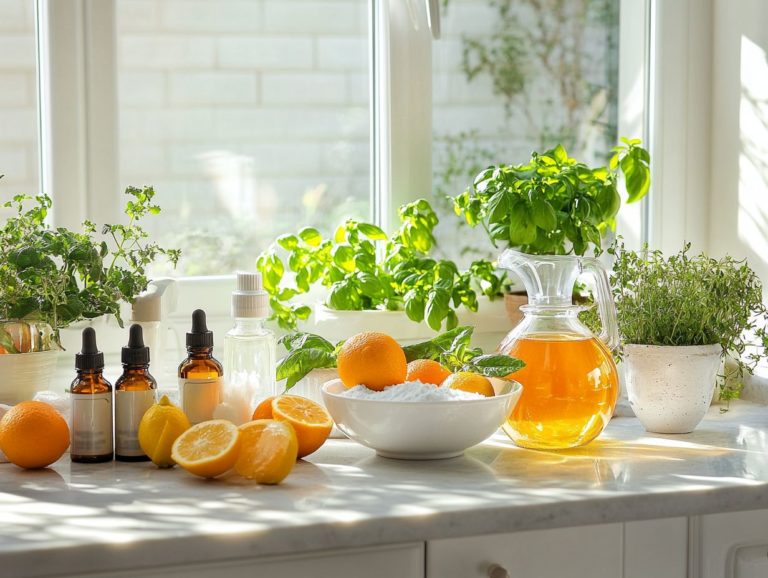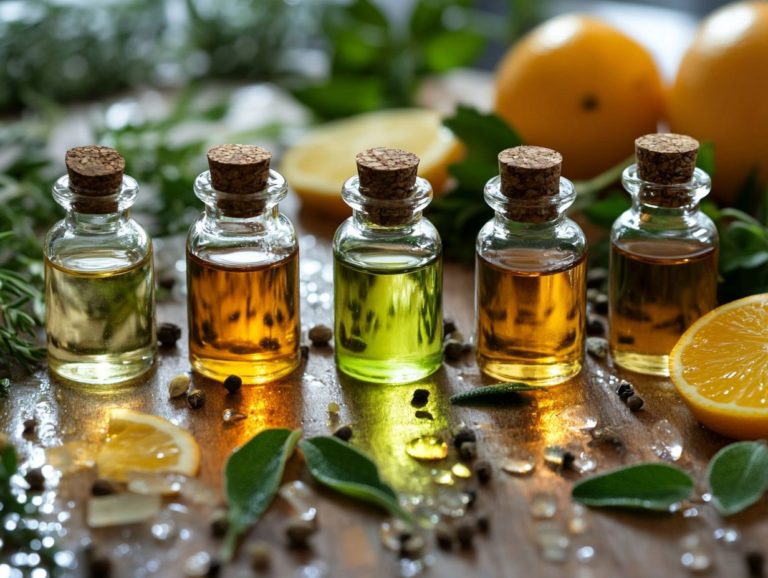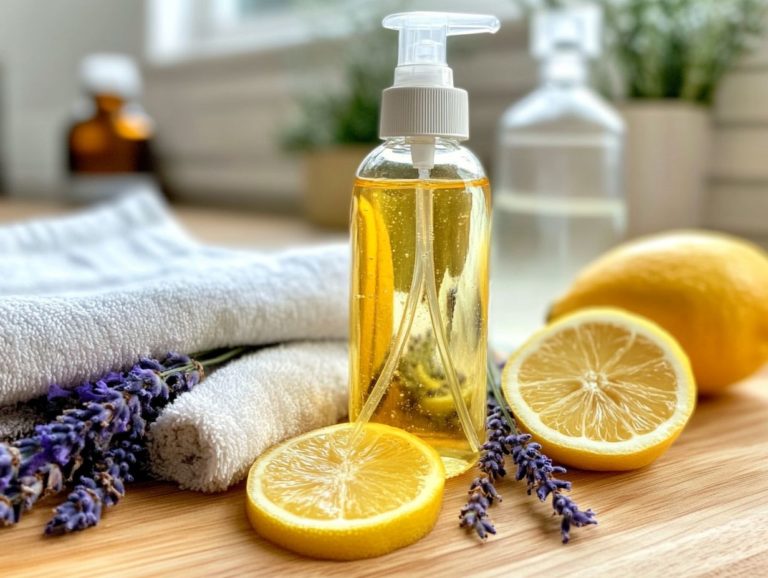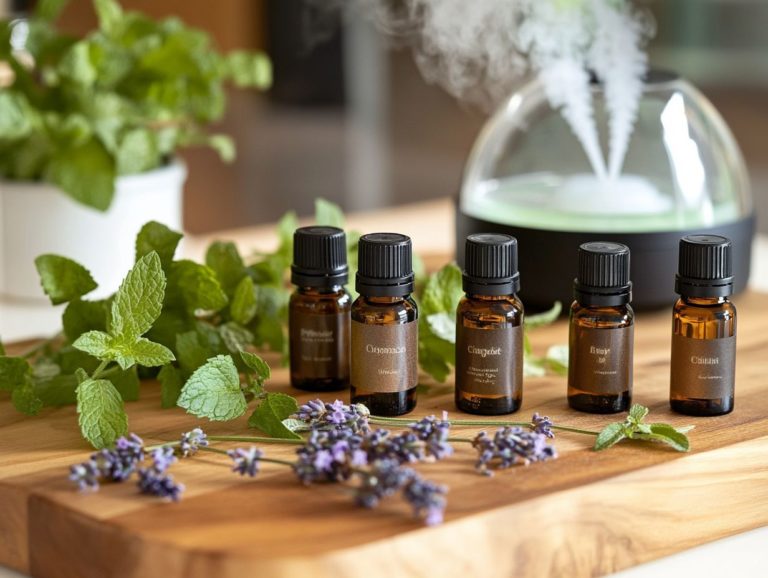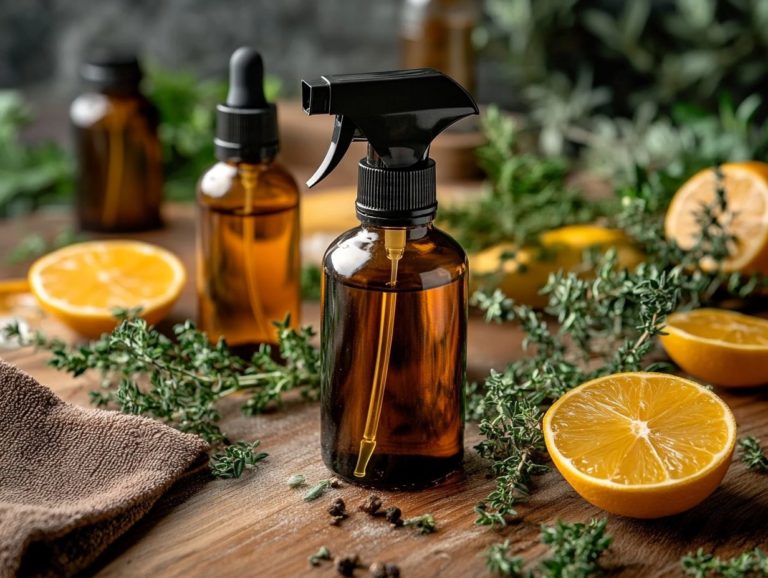Using Essential Oils to Clean Your Kitchen
Essential oils are all the rage! They not only smell amazing but also pack a powerful punch when it comes to cleaning your home.
In this exploration, you’ll discover how these natural extracts can transform your cleaning routine. In particular, they shine in the kitchen, showing you how to achieve a chemical-free home.
From the many benefits of using essential oils for cleaning to practical tips for crafting your own DIY cleaning solutions, you’ll find all the information you require.
You’ll also find safety precautions, alternatives, and storage advice to help you maximize the effectiveness of your essential oils, ensuring they remain potent and effective as kitchen cleaners.
Embrace a fresh, eco-friendly approach to achieving a pristine kitchen with pure essential oils!
Contents
- Key Takeaways:
- What are Essential Oils?
- How to Use Essential Oils for Cleaning Your Kitchen?
- What are the Safety Precautions for Using Essential Oils for Cleaning?
- What are the Alternatives to Using Essential Oils for Cleaning?
- How to Properly Store Essential Oils for Cleaning?
- How to Incorporate Essential Oils into Your Regular Cleaning Routine?
- Frequently Asked Questions
- 1. Can essential oils really clean my kitchen?
- 2. What are the best essential oils to use for cleaning my kitchen?
- 3. How do I use essential oils to clean my kitchen?
- 4. Are there any surfaces that I shouldn’t use essential oils on?
- 5. Can I use essential oils to clean my cutting boards and other food preparation surfaces?
- 6. How often should I clean my kitchen with essential oils?
Key Takeaways:
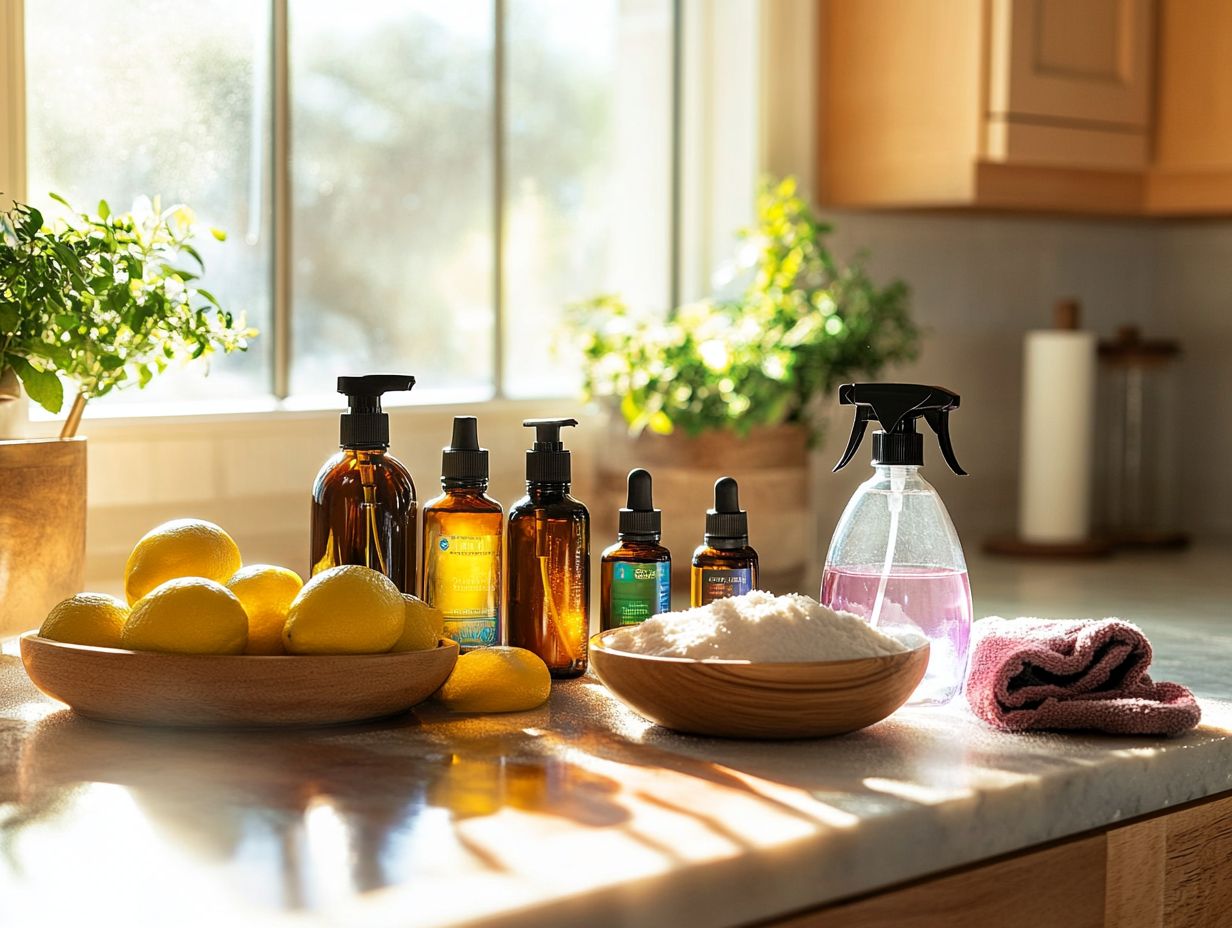
What are Essential Oils?
Essential oils are concentrated plant extracts that capture the natural aromas and beneficial properties of a variety of plants, flowers, and trees, providing a broad spectrum of essential oil uses.
You can use them in aromatherapy, personal care, and household cleaning products, enjoying both their therapeutic benefits and delightful scents.
Whether it’s the zesty brightness of lemon or the calming essence of lavender, these pure essential oils are carefully derived through methods like steam distillation a technique that uses steam to extract oils from plants or cold pressing, ensuring that the plant’s essence is preserved in a potent form for various essential oil recipes.
As the demand for natural and chemical-free homes escalates, essential oils are gaining traction for creating effective DIY cleaning solutions that are safe and nontoxic, helping you maintain a clean kitchen.
What are the Benefits of Using Essential Oils for Cleaning?
Using essential oils for cleaning presents you with a world of benefits, especially if you’re committed to maintaining a pristine kitchen without the harsh sting of chemical cleaners. These natural cleaning products are versatile and effective.
These oils do more than just wipe out germs and bacteria; they fill your spaces with delightful, natural fragrances that uplift your home.
By weaving essential oils into your cleaning routine, you create nontoxic products that are safe for both your family and pets. For instance, tea tree oil and lemon oil are celebrated for their antibacterial properties, making them ideal for crafting homemade cleaners that foster a healthier living environment.
Beyond their germ-fighting prowess, essential oils like lavender and eucalyptus infuse your chores with soothing scents that can elevate your mood as you tackle the tasks at hand, making natural cleaning a joy.
These oils not only offer a pleasant aromatic experience but also possess antiviral and antifungal qualities, contributing to a clean and safe atmosphere.
Citrus oils, such as orange and grapefruit, leave surfaces smelling invigoratingly fresh while effortlessly cutting through grease and grime. You can find high-quality essential oils at your local health food store or on online platforms like Amazon.
By embracing these natural cleaning methods, you significantly reduce your exposure to harmful chemicals, all while adopting a more environmentally friendly approach to housekeeping. Consider exploring essential oil blends to create customized cleaning solutions.
How to Use Essential Oils for Cleaning Your Kitchen?
Incorporating essential oils into your kitchen cleaning routine is a simple yet transformative way to elevate your approach to maintaining a clean and inviting space, free from harmful chemicals.
Start by choosing pure essential oils renowned for their cleaning capabilities, such as lemon, tea tree, or eucalyptus. These oils are available from reputable brands like Puretive Botanics, AromaForce, Aura Cacia, Now, and Pure Essences.
You might even consider crafting your own DIY cleaning solutions. Just a few drops of essential oils mixed with vinegar or water can create a powerful kitchen cleaner that tackles dirt and grime naturally.
This method not only guarantees a spotless kitchen but also fills the space with uplifting aromas, enriching your cooking experience. You can even use essential oils to flavor dishes, adding a unique twist to your culinary creations.
What are the Best Essential Oils for Cleaning Your Kitchen?
In terms of cleaning your kitchen effectively, certain essential oils truly shine thanks to their unique properties and delightful scents. Lemon essential oil is a standout, celebrated for its natural antibacterial prowess and zesty aroma making it the perfect choice for refreshing cutting boards and countertops.
Tea tree oil is a great option, renowned for its antimicrobial abilities that help banish germs.
Then there’s lavender essential oil, which not only imparts a calming fragrance but also boasts antibacterial properties, making it an invaluable addition to your cleaning toolkit.
By incorporating these pure essential oils into your cleaning routine, you can elevate both the hygiene and ambiance of your kitchen.
Other noteworthy players in the kitchen cleaning arena include eucalyptus and peppermint oils, which are effective and recognized by the Food and Drug Administration for their safety when used correctly.
Eucalyptus oil is known for its disinfectant qualities, offering a refreshing scent while effectively combating mold and mildew, especially in those damp corners of your kitchen. Peppermint oil invigorates the atmosphere and serves as a natural pest deterrent, ideal for keeping pesky insects at bay.
Don t hesitate to experiment with blends of these essential oils to craft customized cleaning solutions tailored to your specific tasks, whether it s degreasing surfaces or freshening up appliances! By integrating these nontoxic options into your cleaning practices, you can significantly enhance cleanliness and foster a healthier kitchen environment.
How to Make Your Own Essential Oil Cleaning Solutions?
Creating your own essential oil cleaning solutions is an empowering way for you to embrace natural cleaning practices while keeping your home free from harsh chemicals. Get ready to whip up your own simple and effective DIY cleaning recipes by combining everyday ingredients with essential oils, resulting in aromatic cleaners tailored to various surfaces.
Not only do these homemade alternatives minimize your exposure to harmful chemicals, but they also offer a chance for you to customize them according to your personal scent preferences. For instance, mixing baking soda with lavender essential oil yields a delightful carpet freshener that eliminates odors while infusing your living space with a calming aroma.
Similarly, a blend of castile soap (a gentle soap made from vegetable oils), water, and eucalyptus essential oil can create a fragrant bathroom cleaner that tackles soap scum and leaves a refreshing scent in its wake. This homemade cleaner is a testament to the power of pure botanical ingredients.
By opting for pure botanical ingredients, the effectiveness of your cleaners is enhanced, allowing you to feel confident about the safety of your formulations.
Don’t hesitate to unleash your creativity as you personalize these recipes; it can transform cleaning into a more enjoyable and sustainable experience.
What are the Safety Precautions for Using Essential Oils for Cleaning?
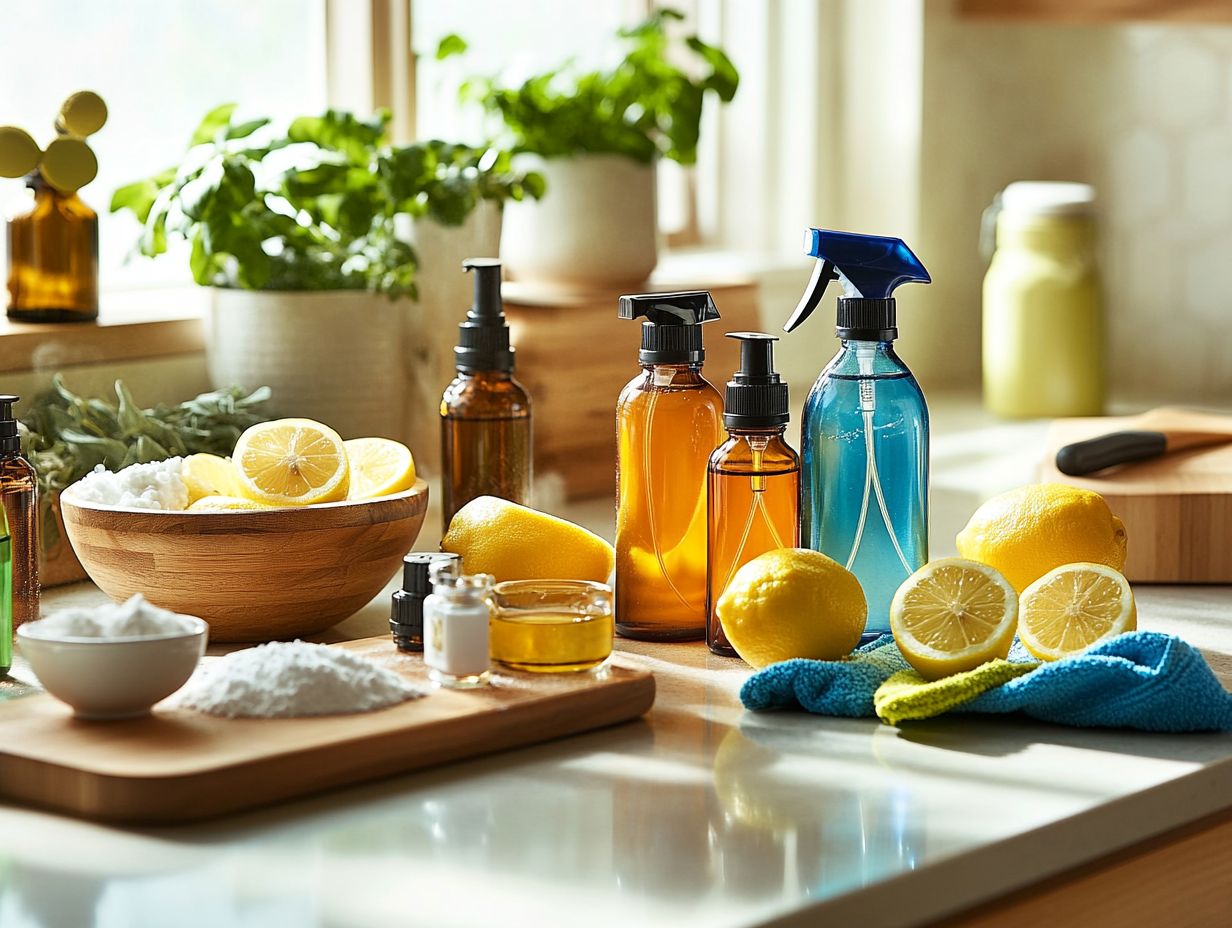
While essential oils can elevate your cleaning routine with their myriad benefits, it s vital to recognize the safety precautions necessary for their use, ensuring your home remains healthy and free of harsh chemicals. Always store your essential oils properly to keep them effective.
Not every essential oil is suitable for every environment or individual, so it’s important for you to research and choose pet-safe options when cleaning in the presence of animals. Some oils can cause skin irritation if not used correctly, so dilute them in a carrier oil or use them in a well-ventilated space.
Stay informed! Embrace the aromatic essence of essential oils confidently in your cleaning endeavors.
What are the Potential Risks of Using Essential Oils for Cleaning?
While essential oils offer a natural alternative to conventional cleaning products, it s crucial not to overlook the potential risks associated with their use. Some individuals can experience skin irritation or allergic reactions when essential oils are applied directly. This highlights the necessity of performing small skin tests before using them more broadly.
Inhaling essential oils in concentrated amounts can also lead to respiratory issues, particularly for those with pre-existing conditions. Understanding these risks helps you recognize the potential dangers while enjoying the benefits of essential oils safely.
To further mitigate these concerns, it’s wise to dilute essential oils with a carrier oil or water before application, and always use them in well-ventilated spaces. Consider trusted brands like Puretive Botanics and Aura Cacia, known for their safe and high-quality essential oils.
Consider choosing oils that are less likely to cause adverse reactions, such as lavender or tea tree oil, recognized for their gentle properties.
Safety should always be a priority. Keeping informed about proper storage, safe concentrations, and tuning in to your body s responses will enhance your cleaning experience without compromising your health. By taking these precautions, you can seamlessly integrate essential oils into your cleaning routines while prioritizing your well-being.
What are the Alternatives to Using Essential Oils for Cleaning?
If you re on the hunt for alternatives to essential oils for cleaning, there are numerous natural products and everyday items that can serve as effective substitutes.
- Vinegar
- Baking soda
- Hydrogen peroxide
These common alternatives possess remarkable cleaning properties and can tackle a variety of tasks without resorting to synthetic chemicals. Brands like Aura Cacia and Pure Essences offer excellent options for your DIY cleaning needs.
Not only are these natural ingredients cost-effective, but they also contribute to a chemical-free home environment.
Whether you decide to whip up your own DIY cleaning solutions or choose from store-bought nontoxic options, you ll find plenty of choices to help keep your kitchen sparkling clean.
What are the Benefits of Natural Cleaning Products?
Natural cleaning products present a wealth of benefits, making them an appealing choice for anyone looking to cultivate a cleaner and healthier living space. Unlike traditional cleaners laden with harsh chemicals, natural alternatives offer you a chemical-free home that s safer for both your family and pets. By utilizing the strength of plant-based ingredients, these safe products effectively tackle dirt and grime without leaving behind harmful residues.
Many of these natural cleaners even feature delightful fragrances derived from essential oils or botanical extracts, which are natural ingredients derived from plants, turning your cleaning routine into a refreshing experience. You can find these products easily on Amazon or at your nearest Health Food Store.
These products also prioritize sustainability, minimizing the environmental impact tied to their production and disposal. For example, vinegar and baking soda are strong cleaning agents capable of addressing everything from windows to stubborn stains, while castile soap makes an excellent base for versatile multi-surface cleaners. Not only do they break down easily in nature, but they also reduce the risk of exposing aquatic life to hazardous chemicals. Brands like Puretive Botanics and AromaForce are popular for their eco-friendly options.
By choosing natural cleaning solutions, you re not just making a healthier choice for your home; you re also contributing to a cleaner planet. This approach is now essential in modern cleaning routines, allowing you to embrace both wellness and environmental stewardship.
How to Make Your Own DIY Natural Cleaning Products?
Creating your own natural cleaning products is not only straightforward but also incredibly satisfying. It gives you the power to customize formulas that cater specifically to your cleaning needs while ensuring your home remains free of harsh chemicals.
With just a handful of essential ingredients, whip up effective solutions for your kitchen and bathroom. For example, incorporating a few drops of essential oils like tea tree, lemon, or lavender elevates the fragrance of your cleaning concoctions while imparting natural antibacterial properties. Don’t hesitate to experiment with different ratios and additional components to achieve results that are uniquely tailored to your preferences.
Whether you’re confronting stubborn stains or simply aiming for a fresh ambiance, these natural alternatives offer peace of mind and are gentle on the environment. Gather your supplies and start mixing today! You ll love discovering the perfect combinations for your home! Remember, incorporating Pet-safe Essential Oils like chamomile and geranium can ensure a safer environment for your pets.
How to Properly Store Essential Oils for Cleaning?
Proper storage of essential oils is vital for preserving their potency and extending their shelf life, allowing you to enjoy the maximum benefits of these exquisite botanical ingredients. It’s best to keep your essential oils in dark glass bottles, safeguarding them from light degradation, and store them in a cool, dry place away from any heat sources. Always ensure you’re using oils approved by the Food and Drug Administration to guarantee safety and quality.
This approach keeps the aromas intact and enhances the effectiveness of the essential oils you incorporate into your cleaning routines. Moreover, labeling your essential oil bottles with the purchase date enables you to effortlessly keep track of their freshness and usability.
What are the Best Storage Methods for Essential Oils?
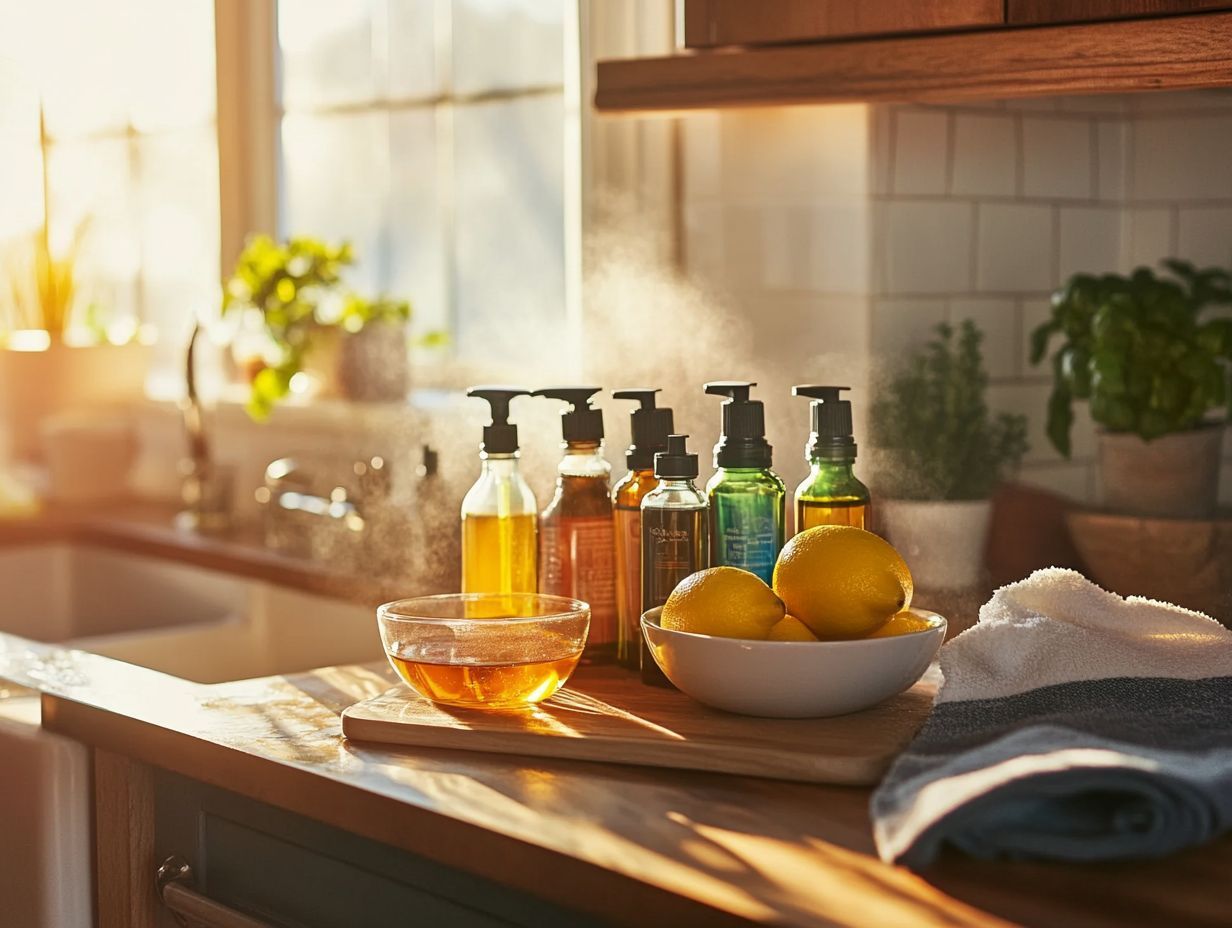
To ensure the longevity and effectiveness of your essential oils, it s essential to adopt the best storage methods. Using dark glass bottles provides a protective barrier against UV rays and prevents oxidation that can occur with plastic containers.
Consider using tightly sealed containers to minimize air exposure. This is important because air can degrade the quality of your oils over time.
It s advisable to store these precious liquids in a climate-controlled environment, ideally at temperatures below 70 F (21 C). Humidity can impact the quality of your oils, so opt for a dry area away from moisture.
Regularly check for any changes in scent or viscosity. These changes can indicate degradation.
By prioritizing optimal storage conditions and selecting the right containers, you can safeguard your essential oils. This ensures they retain their potency and aroma for years to come.
How Long Do Essential Oils Last?
The shelf life of essential oils can vary depending on the type and how you store them. Generally, most pure essential oils last between 1 to 3 years when kept in optimal conditions.
Factors like exposure to light, heat, and air play a crucial role in determining how long your oils remain effective. Proper storage practices are key to extending their usability.
Some popular choices among people who enjoy using scents from essential oils are citronella, patchouli, and sandalwood. Some oils, such as citrus, might not last as long, while others like patchouli or sandalwood can improve with age when stored properly.
For instance, lavender and peppermint essential oils can last about 3 to 5 years if stored in dark glass bottles away from direct sunlight. In contrast, oils like rosemary may only endure for about a year due to their higher oxidation rates.
It s vital to keep your oils in cool, dry places ideally at room temperature to preserve their beneficial properties. Using airtight containers can significantly reduce air exposure, further extending their shelf life.
Regularly checking for any changes in aroma or consistency can help you determine if an oil has gone bad. A noticeable change usually signals that it s time for a replacement.
Understanding these nuances will enhance your care and storage practices. This ensures you can fully enjoy the benefits of your essential oils, whether you re an aromatherapy enthusiast or a DIY aficionado.
How to Incorporate Essential Oils into Your Regular Cleaning Routine?
Transform your cleaning routine with essential oils for an enjoyable experience! Begin by choosing a selection of essential oils that resonate with you perhaps lemon for its invigorating aroma or chamomile and lavender for their soothing properties.
You can seamlessly integrate these oils into your DIY cleaning solutions. Alternatively, add a few drops to your favorite nontoxic cleaning products for an aromatic enhancement.
By making essential oils a key part of your cleaning arsenal, you ll cultivate a healthier and more inviting home environment. Plus, you can reap the rewards of pure botanical ingredients.
What are Some Tips for Using Essential Oils for Cleaning?
Using essential oils effectively for cleaning requires a thoughtful approach to get the most out of them. Start by diluting essential oils with a carrier solution, such as vinegar or water, to safely apply them on various surfaces. Blending complementary essential oils can also be beneficial; for instance, combining eucalyptus, thyme, and tea tree oils amplifies their antibacterial properties, making your cleaning routine even more effective.
Always perform a spot test on surfaces before applying widely to avoid any damage. Remember to ventilate your cleaning area for safety.
As you incorporate essential oils into your cleaning practice, consider their unique properties and select those that align with your cleaning goals. Lemon oil has an uplifting scent and natural degreasing abilities, making it perfect for the kitchen, while lavender oil creates a calming atmosphere in bedrooms. Measuring the right dilution ratio is crucial; typically, a drop or two mixed with a few tablespoons of carrier will suffice for general cleaning tasks.
Store essential oils in dark glass containers to maintain their potency. Sharing your essential oil cleaning triumphs on social media can inspire others and help build a community of individuals seeking healthier cleaning alternatives.
How Often Should You Use Essential Oils for Cleaning?
The frequency of using essential oils for cleaning depends on your preferences, specific tasks, and the oils you choose. A good rule of thumb is to integrate essential oils into your cleaning routine at least once a week for regular upkeep, especially in high-traffic areas like your kitchen. For deep cleaning sessions or seasonal tasks, consider increasing the frequency for a thorough cleanse. Tailoring your cleaning schedule to fit your home helps create a fresh and inviting atmosphere.
It’s essential to consider the types of surfaces in your home. For instance, porous materials may absorb oils more readily, allowing for less frequent applications. In contrast, hard surfaces benefit from regular use of essential oils to effectively combat grime and odors. Combining essential oils with vinegar enhances their cleaning power.
In areas such as bathrooms and living spaces, adjust your cleaning routine based on traffic and usage for better results. Don’t hesitate to experiment with various oils like tea tree, lavender, or chamomile for specific tasks, fine-tuning your routine to what feels most effective and refreshing for you.
This personalized approach not only promotes a cleaner environment but can also transform your space into a serene oasis. If you’re interested in the DIY cleaning movement, these methods offer a natural and effective way to maintain a pristine home.
Frequently Asked Questions
1. Can essential oils really clean my kitchen?
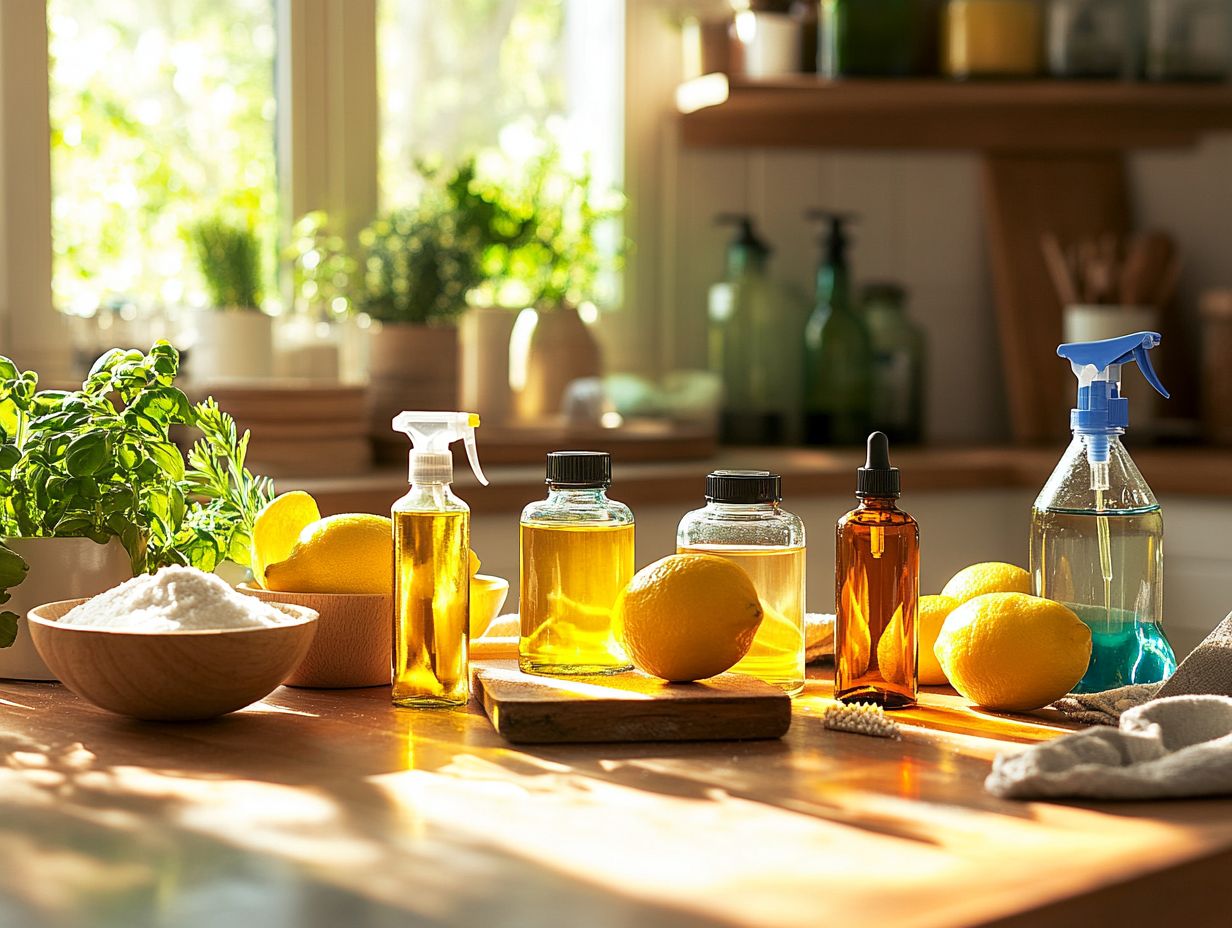
Yes, essential oils have powerful natural cleaning properties that can effectively clean and disinfect your kitchen. Many people find that incorporating essential oils like lemon and thyme into their cleaning routines boosts efficacy and introduces a pleasant aroma.
2. What are the best essential oils to use for cleaning my kitchen?
- Lemon
- Tea tree
- Eucalyptus
- Lavender
- Geranium
These oils are great options for cleaning your kitchen due to their antibacterial and antiviral properties. Brands like Pure Essences, Puretive Botanics, Aura Cacia, and AromaForce offer a variety of oils suitable for these purposes.
3. How do I use essential oils to clean my kitchen?
Mix a few drops of essential oil with water in a spray bottle and use it to clean surfaces, or add a few drops to your dish soap or all-purpose cleaner for an extra boost. Additionally, consider using pet-safe essential oils to ensure the safety of your furry friends.
What are your favorite essential oil cleaning hacks? Share with us! Start your essential oil cleaning routine today for a fresher home!
4. Are there any surfaces that I shouldn’t use essential oils on?
Essential oils can be used on most surfaces, but it’s important to always do a spot test first to ensure it won’t damage or stain the surface. This is particularly true for DIY cleaning solutions that include oils like eucalyptus and citronella.
5. Can I use essential oils to clean my cutting boards and other food preparation surfaces?
Yes, essential oils are safe to use on cutting boards and other food preparation surfaces. They can effectively kill bacteria and germs without leaving any harmful residue behind. However, these claims have not been evaluated by the Food and Drug Administration.
6. How often should I clean my kitchen with essential oils?
It’s recommended to clean your kitchen with essential oils at least once a week, or more often if it gets heavily used. This will help keep germs and bacteria at bay and maintain a clean and healthy kitchen environment.

